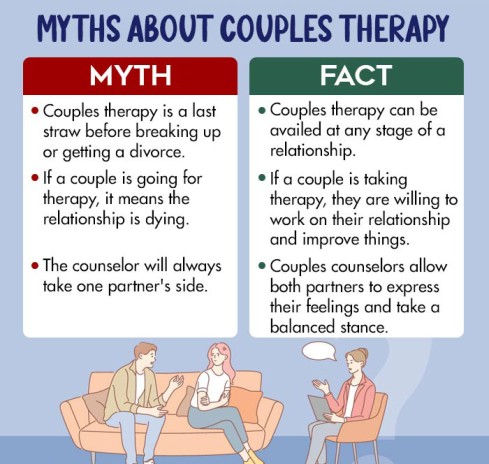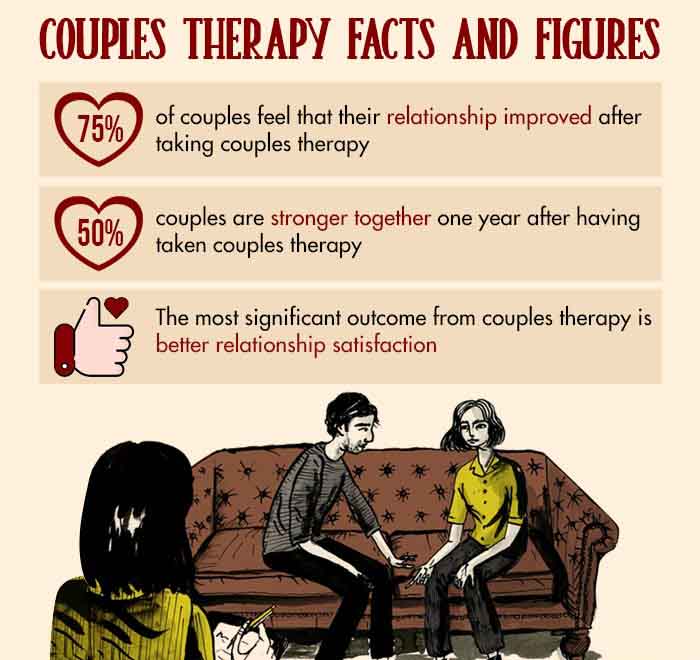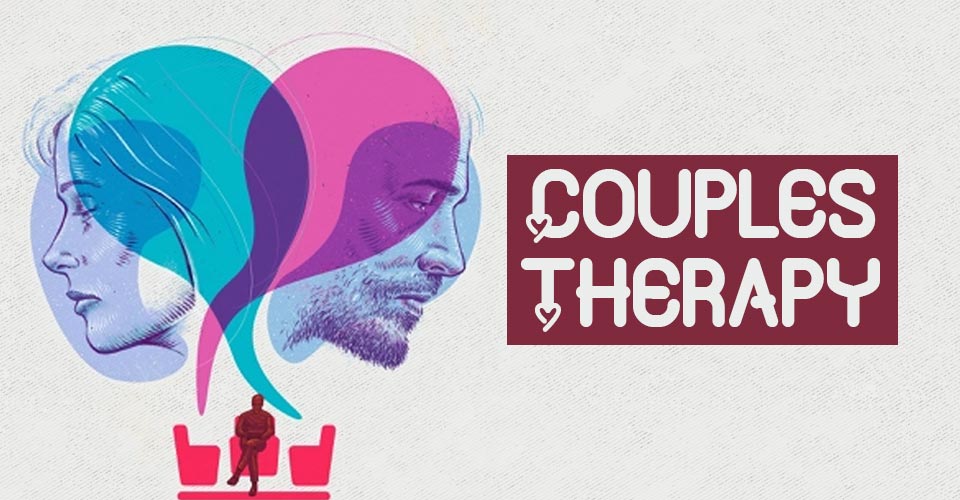Couples therapy is a type of therapy that seeks to address relationship issues and interpersonal conflicts between partners in a romantic or intimate or marital relationship.
What Is Couples Therapy?
Couples therapy is a form of therapy 1 APA Dictionary of Psychology. (n.d.). Dictionary.apa.org. Available from: https://dictionary.apa.org/couples-therapy in which two romantic partners in a committed relationship are treated at the same time by the same therapist.
This therapy helps couples address problems they are facing as a couple such as communication gaps, conflicts, etc. Couples therapy for married couples is known as marital therapy.

Reasons To Start Couples Counseling
Successful relationships require hard work. Often, couples therapy is considered as a last resort when a relationship isn’t working. But sometimes even sound relationships run into troubled waters and may require professional help 2 Couples Therapy for Adults Experiencing Relationship Distress: A Review of the Clinical Evidence and Guidelines. (2014). Canadian Agency for Drugs and Technologies in Health. Available from: https://www.ncbi.nlm.nih.gov/books/NBK253328/ to be whole again.
Couples therapy is not just a remedy for a failing relationship but also a tool to strengthen the foundations of a healthy relationship.
Some benefits of couples therapy include:
- Fostering better understanding
- Identifying relationship issues
- Addressing dysfunctional behavior
- Improving communication skills
- Resolving interpersonal conflicts
- Strengthening friendship and attachment patterns
- Learning social skills
- Improving relationship satisfaction
Types Of Couples Therapy
The different types 3 Couples Therapy for Adults Experiencing Relationship Distress: A Review of the Clinical Evidence and Guidelines. (2014). Canadian Agency for Drugs and Technologies in Health. Available from: https://www.ncbi.nlm.nih.gov/books/NBK253321/ of relationship counseling include:
1. Cognitive Behavioral Conjoint Therapy
Cognitive-behavioral conjoint therapy includes in-and out-of-session exercises that address couple-specific needs and goals. This type of therapy is particularly designed to handle any trauma affecting a romantic relationship, reduce PTSD and associated symptoms, and enhance relationship satisfaction and functioning.
Read More About PTSD Here
2. Existential Couples Therapy
Existential couple therapy aims to address key existential and functional themes in relationships wherein the partners suffer from medical conditions. These include death anxiety, living with uncertainty, coping with treatments, family concerns, body image and self-image concerns, lifestyle effects, and future goals.
Read More About Body Image Here
3. Emotion-Focused Couples Therapy
Emotion-focused therapy is a short-term therapy used to address problematic attachment patterns and improve bonding in adult relationships.
4. Psychodynamic Couples Therapy
Psychodynamic Psychotherapy is an insight-oriented form of couples therapy, designed to help couples explore the difficulties and challenges in their relationships that may be a result of their childhood experiences and trauma.
5. Problem-focused Therapy
This therapy has a problem-focused orientation with a central emphasis on focused communication training around the identified problem. Communication training can be incorporated with guided discussions of ongoing conflicts and reviewing the couple’s patterns.
Does Couples Therapy Work?
Couples therapy has become popular in recent years for enhancing the quality of a relationship and promoting relationship satisfaction. Relationship counseling has been widely associated with communication, forgiveness, problem-solving, and the resolution of unmet needs.
Recent studies 4 Ahluwalia, H., Anand, T., & Suman, L. N. (2018). Marital and family therapy. Indian journal of psychiatry, 60(Suppl 4), S501–S505. https://doi.org/10.4103/psychiatry.IndianJPsychiatry_19_18 have emerged, revealing that couples who receive 8–12 sessions of online couples therapy report reduced distress and increased relationship satisfaction 5 Schofield, M. J., Mumford, N., Jurkovic, D., Jurkovic, I., & Bickerdike, A. (2012). Short and long-term effectiveness of couple counselling: a study protocol. BMC public health, 12, 735. https://doi.org/10.1186/1471-2458-12-735 for both partners, with benefits lasting even two years after treatment.

How To Prepare For Couple Therapy
It can be daunting to confide in a stranger regarding certain problems in your relationship. Before approaching a couples therapist, it is necessary to acknowledge that your relationship may benefit from an expert’s guidance.
Consider the following tips to prepare for couples therapy:
- Make sure that both of you are invested in attending therapy together. Discuss shared goals with your partner before you start couples therapy.
- Search for a licensed couples therapist near you and discuss privacy expectations.
- Try to listen to your partner’s concerns with an open mind.
- Communicate honestly and openly about your own issues.
- Honor appointments and try to do your homework before every session.
- Commit to therapy for as long as is recommended. Take time to reflect on your thoughts and approaches after every therapy session.
- Have faith in the process and remember that change takes time.
Takeaway
Relationship issues are sensitive and intimate and need to be addressed carefully. The importance of couples therapy lies in dealing effectively with partner conflicts and improving treatment outcomes by addressing issues such as substance use 6 Fals-Stewart, W., O’Farrell, T. J., & Birchler, G. R. (2004). Behavioral couples therapy for substance abuse: rationale, methods, and findings. Science & practice perspectives, 2(2), 30–41. https://doi.org/10.1151/spp042230 , domestic violence, infertility, longer periods of sexual abstinence, etc.
Couples therapy is associated with greater relationship satisfaction and better marital functioning. While there is much stigma around therapy and mental health care in general, couples therapy can help individuals function much better in relationships.
At A Glance
- Couples therapy is a type of therapy that seeks to address relationship issues and interpersonal conflicts between intimate partners.
- There are many different types of couples therapy.
- It seeks to address partner problems related to addiction, domestic violence, medical treatment, emotional dysfunction, etc.
- It is associated with greater relationship satisfaction and functioning.
Frequently Asked Questions (FAQs)
1. How do I get the best out of couples counseling?
To reap the benefits of couples counseling, believe in the therapy process and come to the therapy sessions with an open mind. Prioritize your appointments and fully commit yourself to resolving issues between your partner and yourself.
2. Do psychologists do couples therapy?
Any licensed psychologist can provide therapy. However, some therapists are specialised in family and couples therapy.
3. What special issues of confidentiality may arise in couples counseling?
Apart from the general ethical issues in counseling, there may be some added issues related to confidentiality in couples counseling. At times it is necessary to maintain secrets that people might reveal to the therapist that they have not shared with their partner. A therapist may especially face a dilemma when one partner confides that they have been cheating in the relationship and the other partner is not aware of it.
4. How effective is couples therapy?
Couples therapy can be very effective in addressing relationship issues and preventing partner separations. For instance, the American Psychological Association (APA) 7 Pinsof, W. M., Breunlin, D. C., Russell, W. P., Lebow, J., Rampage, C., & Chambers, A. L. (2018). Integrative systemic therapy : metaframeworks for problem solving with individuals, couples, and families. American Psychological Association. Availble from: https://www.apa.org/pubs/books/integrative-systemic-therapy states 90% of couples who avail relationship counseling show improvement in problems related to substance use, estrangement, sexual abstinence, etc., and report better marital satisfaction.















